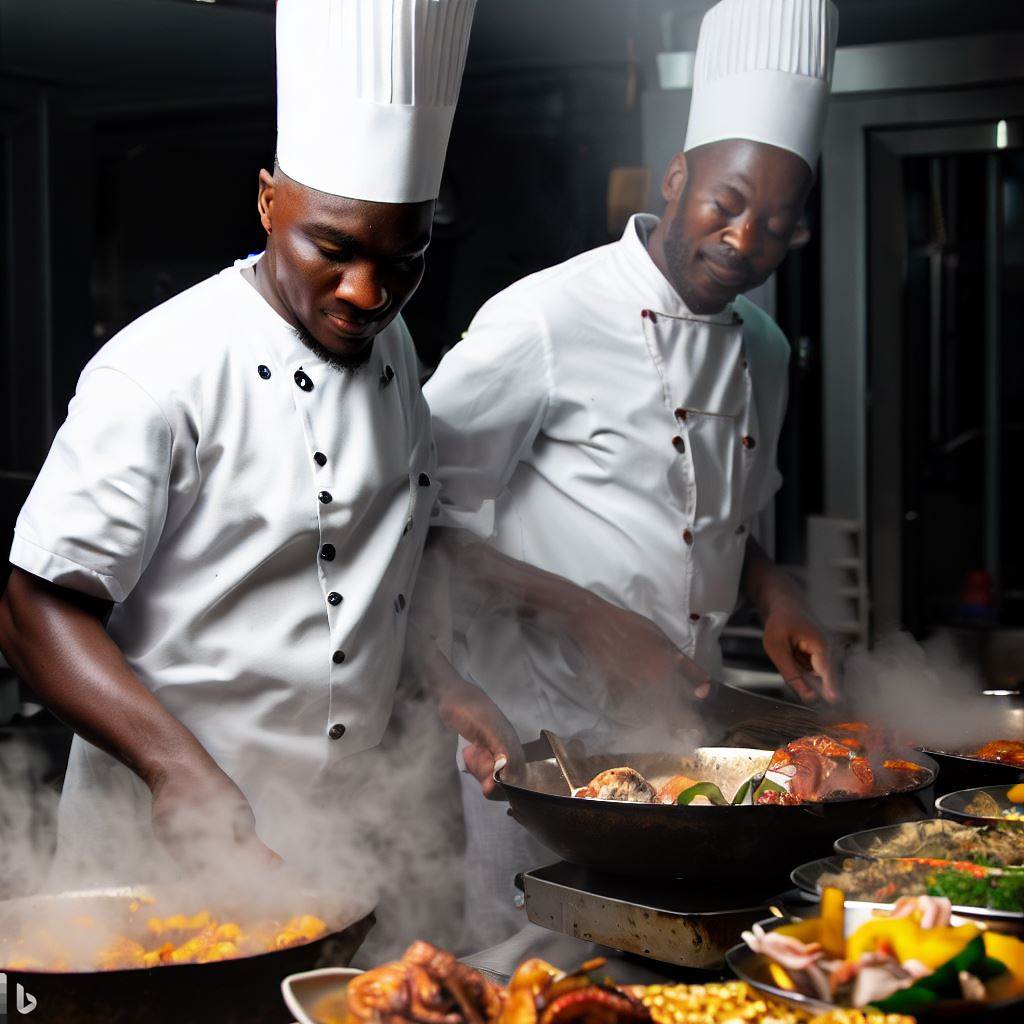Introduction
Chefs play a vital role in shaping Nigeria food culture. They innovate, blend traditional flavors, and introduce new culinary experiences.
A. Nigeria’s Food Culture
Nigeria’s food culture is rich and diverse, reflecting its vibrant traditions, ethnicities, and culinary influences.
B. Nigerian Chefs
Nigerian chefs are the culinary architects behind this gastronomic tapestry, infusing innovation into age-old recipes.
C. Thesis Statement
The role of chefs is essential in shaping and advancing Nigeria’s food culture, preserving heritage while embracing innovation.
They are the stewards of tradition and the pioneers of new flavors, uniting the nation through its love for food.
Historical Background of Nigerian Food Culture
A. Overview of the traditional Nigerian cuisine
- Nigerian cuisine is diverse and reflects the country’s rich cultural heritage.
- It is primarily based on staple crops like yam, cassava, maize, and rice.
- Traditional Nigerian meals often consist of a combination of carbohydrates, protein, and vegetables.
- The cuisine is known for its bold flavors, use of spices, and vibrant colors.
- Popular traditional dishes include jollof rice, pounded yam, egusi soup, and suya.
B. Influence of various ethnic groups and regions on food culture
- Nigeria is home to over 250 ethnic groups, each with its unique culinary traditions.
- These diverse groups have greatly influenced the country’s food culture.
- For example, the Hausa people are known for their spicy and flavorful dishes like miyan kuka and tuwo shinkafa.
- The Yoruba people have popular dishes like amala and ewedu.
- Similarly, the Igbo people have dishes like ofe nsala and ukwa that are unique to their culture.
C. Evolution of Nigerian cuisine throughout history
- Nigerian cuisine has evolved over time due to various factors such as colonization and migration.
- During the colonial era, Nigerian cuisine was influenced by European cooking techniques and ingredients.
- Intercultural interactions and trade also introduced new ingredients and flavors to Nigerian cooking.
- The introduction of spices like cloves, cinnamon, and nutmeg greatly impacted the cuisine.
- Today, Nigerian cuisine continues to evolve as new culinary trends and influences emerge.
The Emergence of Professional Chefs in Nigeria
A. Growth of culinary schools and training centers
- The culinary industry in Nigeria has seen a surge in the establishment of culinary schools and training centers.
- These institutions provide aspiring chefs with the necessary skills and knowledge to excel in the field.
- Through hands-on training and theoretical classes, students are equipped with the foundations of culinary arts.
- Culinary schools and training centers also offer specialized programs focusing on different cuisines and culinary techniques.
- These educational institutions play a crucial role in nurturing and developing the culinary talent in Nigeria.
- They provide a platform for chefs-in-training to gain experience and build a strong foundation in the culinary world.
- The growth of culinary schools and training centers has accelerated the professionalization of chefs in Nigeria.
B. Increased interest in culinary arts and gastronomy
- There has been a significant increase in the interest and appreciation of culinary arts and gastronomy in Nigeria.
- Nigerians have become more adventurous in their food choices, seeking unique dining experiences.
- This trend has fueled the demand for skilled chefs who can create innovative and delicious dishes.
- With the rise of social media and food influencers, there is a growing interest in food presentation and culinary creativity.
- Chefs are now seen as artists, combining flavors, colors, and textures to create culinary masterpieces.
- The increased interest in culinary arts has elevated the status of chefs and highlighted their importance in Nigerian food culture.
C. Rise of Nigerian celebrity chefs
- In recent years, Nigeria has witnessed the emergence of celebrity chefs who have gained significant fame and recognition.
- These chefs have not only showcased their culinary skills but have also become popular media personalities.
- Through television shows, cookbooks, and social media presence, Nigerian celebrity chefs have captured the hearts of the nation.
- They have become role models for aspiring chefs and have helped promote Nigerian cuisine on a global scale.
- Celebrity chefs have also played a crucial role in preserving and reinventing traditional Nigerian dishes.
- With their creative twists and modern interpretations, they have brought Nigerian cuisine to the forefront of global gastronomy.
The emergence of professional chefs in Nigeria has been marked by the growth of culinary schools and training centers, increased interest in culinary arts and gastronomy, and the rise of Nigerian celebrity chefs.
These factors have contributed to the development and promotion of Nigerian cuisine, making it an integral part of the country’s food culture.
The future looks promising for Nigerian chefs as they continue to push boundaries, innovate, and showcase the richness of Nigerian culinary traditions.
Read: Regulations & Compliance in Customer Service in Nigeria
Promoting Local and Traditional Cuisine
A. Preservation and promotion of indigenous ingredients
- Chefs play a crucial role in preserving and promoting indigenous ingredients in Nigerian cuisine.
- They actively seek out native ingredients, such as African yams, bitter leaf, and Nigerian spices.
- Chefs educate customers about the importance of using local ingredients for a more authentic dining experience.
- By incorporating indigenous ingredients into their menus, chefs contribute to the preservation of Nigerian food culture.
B. Rediscovering and reviving traditional recipes
- Nigerian chefs are passionate about rediscovering and reviving traditional recipes that have been forgotten or neglected.
- They delve into the country’s rich culinary history to find unique and authentic recipes.
- Chefs add their own modern twists to traditional dishes, making them relevant and appealing to a wider audience.
- Through their efforts, traditional Nigerian recipes regain popularity and serve as a reminder of the country’s food heritage.
C. Collaborations between chefs and local farmers/producers
- Chefs in Nigeria actively collaborate with local farmers and producers to source fresh, high-quality ingredients.
- These collaborations shorten the supply chain, ensuring that ingredients are sourced directly from local farmers.
- By supporting local farmers, chefs contribute to the growth and sustainability of local communities.
- The partnerships between chefs and farmers also lead to the development of unique and innovative dishes.
Chefs in Nigeria play a vital role in promoting local and traditional cuisine.
They preserve and promote indigenous ingredients, rediscover and revive traditional recipes, and collaborate with local farmers and producers.
Through their efforts, they contribute to the preservation of Nigerian food culture and support the growth and sustainability of local communities.
Chefs in Nigeria are at the forefront of showcasing the richness and diversity of Nigerian cuisine, making it an integral part of the country’s identity.
Read: Networking for Curators: Opportunities in Nigeria

Innovation and Fusion in Nigerian Cuisine
Nigerian cuisine has long been known for its bold flavors, rich textures, and diverse ingredients.
However, in recent years, a new wave of innovation and fusion has emerged in the country’s food culture.
Chefs drive culinary transformation by experimenting with international techniques and integrating foreign flavors into traditional Nigerian dishes.
A. Experimentation with international culinary techniques
One of the key ways in which Nigerian chefs are reshaping the country’s food culture is through the experimentation with international culinary techniques.
These chefs are not afraid to go beyond traditional Nigerian cooking methods and incorporate techniques from all around the world.
For example, Nigerian chefs have started embracing French cooking techniques such as sous vide and molecular gastronomy.
They have also incorporated Asian cooking methods like stir-frying and steaming as Chefs Role in Nigeria Food Culture is concerned
This blending of techniques allows for the creation of unique and innovative dishes that push the boundaries of traditional Nigerian cuisine.
B. Integration of foreign flavors and ingredients into traditional dishes
In addition to experimenting with international culinary techniques, Nigerian chefs are also integrating foreign flavors and ingredients into traditional dishes.
This fusion of flavors creates a new dining experience that combines the best of both Nigerian and international cuisine.
For instance, Nigerian chefs have started using ingredients like quinoa, avocado, and kale in their dishes.
These ingredients are not traditionally found in Nigerian cuisine but have become popular due to their health benefits and global popularity.
By incorporating these ingredients, chefs are catering to evolving tastes and preferences while maintaining the essence of Nigerian flavors.
C. The role of chefs in modernizing and diversifying Nigerian food
The role of chefs in modernizing and diversifying Nigerian food cannot be overstated.
These culinary innovators are pushing the boundaries of traditional cuisine, introducing new flavors, techniques, and ingredients to the Nigerian food scene.
Through their creativity and expertise, chefs have the power to redefine Nigerian food culture both locally and internationally.
They are not only making Nigerian cuisine more exciting and appealing to a global audience but also preserving and celebrating the country’s culinary heritage.
Moreover, the role of chefs extends beyond the kitchen. They are ambassadors of Nigerian culture, showcasing the country’s diversity through its food.
Chefs are actively involved in culinary festivals, food collaborations, and cultural exchange programs, further contributing to the growth and promotion of Nigerian cuisine.
The innovation and fusion happening in Nigerian cuisine can be attributed to the creativity and expertise of chefs and Chefs Role in Nigeria Food Culture
They experiment with international techniques, blend foreign flavors into traditional dishes, and modernize Nigerian food, shaping an exciting food culture.
Nigerian cuisine is witnessing a culinary revolution, and it is the chefs who are at the forefront of this transformation.
Read: Women in Customer Service in Nigeria: Success Stories
Culinary Tourism and Economic Impact
A. Nigerian dishes in the global food scene
- The role of chefs in promoting Nigerian cuisine internationally is essential.
- Through their creativity and expertise, chefs showcase Nigerian dishes to the world.
- They incorporate traditional flavors and cooking techniques to create innovative and unique recipes.
- By participating in international food competitions, Nigerian chefs gain recognition and appreciation.
- They put Nigerian dishes on the map, attracting food enthusiasts and tourists to the country.
- Chefs also collaborate with international chefs to introduce fusion dishes that blend Nigerian and global cuisines.
- Through their influence and culinary skills, Nigerian chefs help elevate the image of Nigerian food worldwide.
B. Promoting food tourism to attract visitors
- Chefs play a crucial role in promoting food tourism and attracting visitors to Nigeria.
- They organize food festivals, showcasing diverse Nigerian dishes and delicacies.
- These festivals provide an opportunity for locals and tourists to experience the rich food culture.
- Chefs also collaborate with local farmers and markets to source fresh and organic ingredients.
- They establish connections with local producers, supporting and promoting sustainable farming practices.
- Through their culinary events and collaborations, chefs create a platform for cultural exchange.
- Nigerian food becomes a bridge that connects people from different backgrounds and cultures.
C. Contribution of chefs to job creation and entrepreneurship
- By creating culinary businesses, chefs contribute significantly to job creation and entrepreneurship in Nigeria.
- They establish restaurants, cafes, and food trucks, providing employment opportunities for locals.
- These establishments require kitchen staff, servers, bartenders, and management personnel.
- Chefs also train and mentor aspiring chefs, imparting their knowledge and skills to the next generation.
- They inspire young entrepreneurs to pursue careers in the food industry and start their own businesses.
- Chefs contribute to the growth of local economies by sourcing ingredients from local suppliers.
- They support small-scale farmers and artisans, creating a sustainable food ecosystem in Nigeria.
Chefs play a vital role in promoting Nigerian cuisine globally, attracting food tourists, and contributing to job creation and entrepreneurship.
Their creativity, expertise, and culinary events showcase Nigerian dishes on the global food scene, putting Nigeria on the map as a culinary destination.
By collaborating with local farmers and promoting sustainable practices, chefs also contribute to the growth of local economies and create a platform for cultural exchange.
Read: Remote Customer Service Jobs in Nigeria: Opportunities
Challenges and Opportunities for Nigerian Chefs
In Nigeria, chefs face several challenges and opportunities in their role within the country’s vibrant food culture.
A. Limited access to modern culinary tools and equipment
- Chefs in Nigeria often struggle with limited access to modern culinary tools and equipment.
- The lack of availability of high-quality kitchen appliances hinders their ability to experiment and create innovative dishes.
- This constraint can limit the growth and development of Nigerian chefs, hindering their ability to compete internationally.
- It is essential for the Nigerian government and culinary organizations to invest in providing chefs with modern tools and equipment.
B. Lack of government support and investment in the food industry
- One of the biggest challenges faced by Nigerian chefs is the lack of government support and investment in the food industry.
- The government’s failure to recognize the potential of the culinary sector hampers its growth and development.
- Without adequate support, chefs struggle to access training programs, secure loans, or receive funding for culinary initiatives.
- Government-backed initiatives, such as grants and tax incentives, could significantly boost the food industry and create opportunities for chefs.
C. Potential for growth and recognition in the global culinary scene
- Despite the challenges they face, Nigerian chefs have a remarkable opportunity for growth and recognition in the global culinary scene.
- Nigeria’s rich cultural heritage and diverse cuisine provide an excellent platform for showcasing Nigerian culinary talents.
- By leveraging social media and participating in international culinary events, chefs can gain global exposure for their skills.
- The global trend towards embracing diverse cuisines presents a unique chance for Nigerian chefs to introduce their authentic flavors to a wider audience.
- Nigerian chefs can also collaborate with international chefs, exchange ideas, and learn new techniques to enhance their culinary expertise.
Nigerian chefs face challenges such as limited access to modern culinary tools and equipment and a lack of government support to enhance Chefs Role in Nigeria Food Culture.
However, they also have opportunities for growth and recognition in the global culinary scene.
It is crucial for the government and relevant stakeholders to invest in the food industry and provide chefs with the necessary resources and support.
By doing so, Nigerian chefs can further contribute to the country’s food culture and establish themselves as culinary ambassadors on the world stage.
You Might Also Like: Top Coating Technician Schools in Nigeria: A 2023 List
Conclusion
A. The significance of chefs in Nigeria’s food culture
Chefs play a vital role in Nigeria’s food culture, showcasing the nation’s rich culinary heritage.
B. Importance of preserving and promoting Nigerian cuisine
It is important to preserve and promote Nigerian cuisine to ensure its continued recognition and appreciation.
C. Final thoughts on the role of chefs in shaping the nation’s food future.
The role of chefs in shaping the nation’s food future is immense, as they inspire innovation and elevate Nigerian gastronomy.




